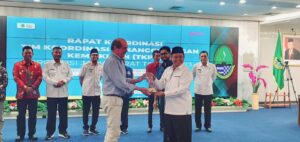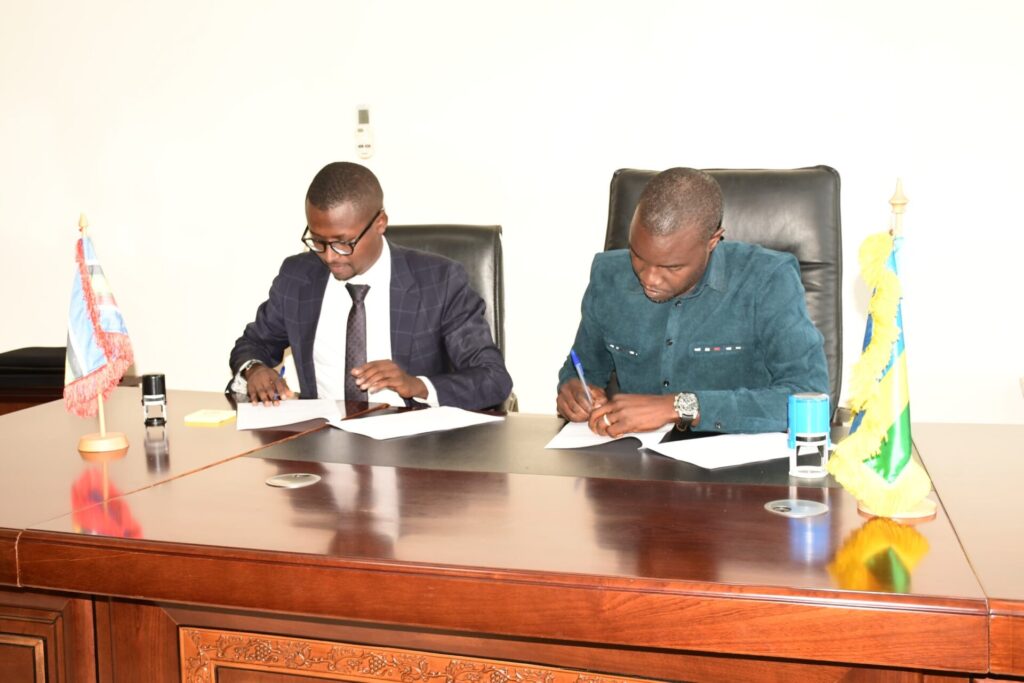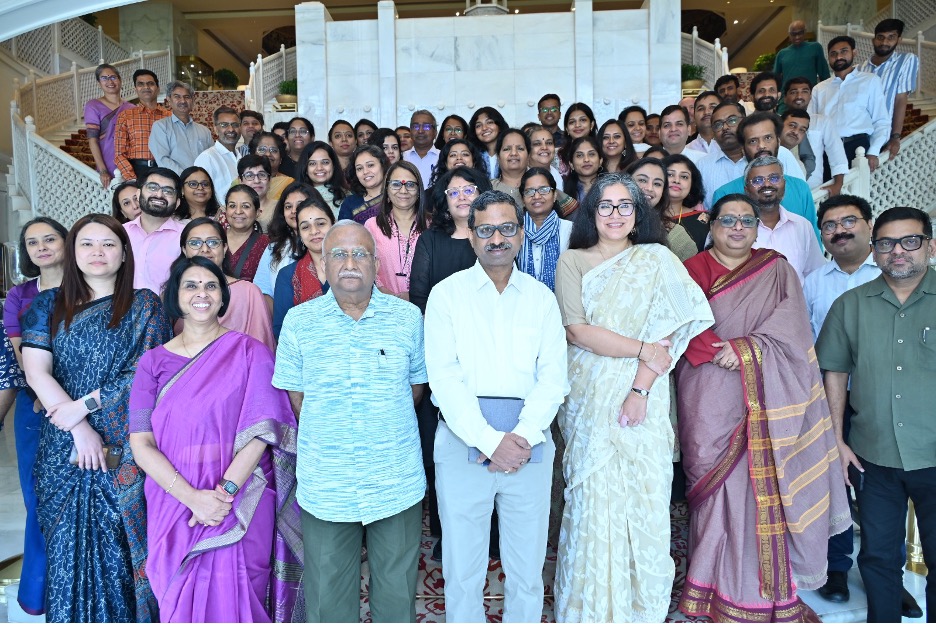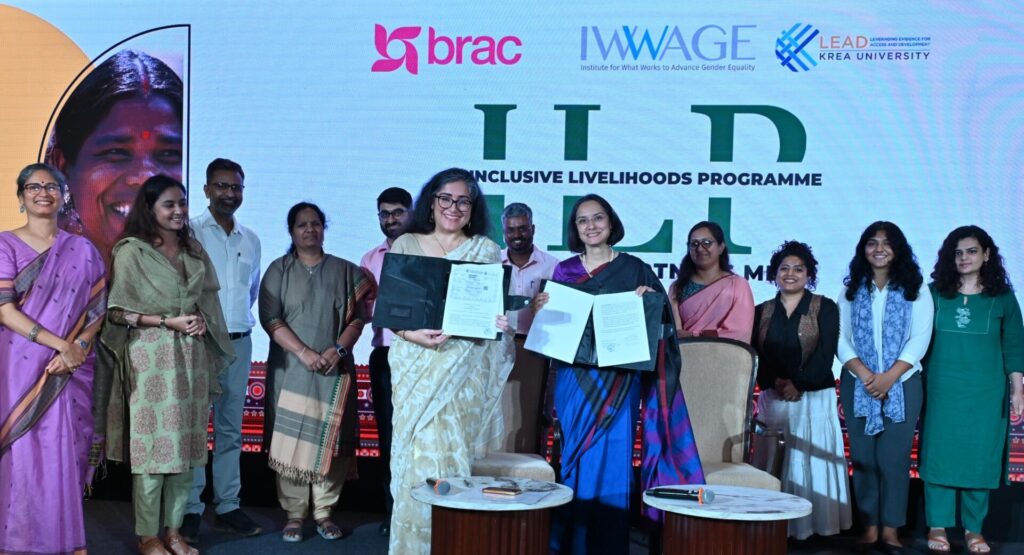By Abdurrahman Syebubakar | Country Lead for Indonesia, Ultra-Poor Graduation Initiative and Courtney Calardo | Head of Communications, Ultra-Poor Graduation Initiative
Caption (above): A photo session with the Governor and almost all heads/vice heads of districts and mayors/vice mayors in West Sumatra province after they signed a joint statement and the plan of action to integrate the Graduation model into their local plans and budgets.
Indonesia made significant strides toward poverty reduction in the last few decades, according to the World Bank. However, the pandemic and fragmentation of poverty reduction programmes caused progress to slow in recent years. In March 2023, the Central Bureau of Statistics estimated there to be 25.90 million people living in poverty across Indonesia. This is not to mention the sizable number of people who just live above the poverty line, remaining highly vulnerable to economic shocks or other crises and who are at risk of becoming poor.
As the most populous province in Indonesia, West Java has nearly 50 million people in 18 districts and 9 municipalities – 3.89 million of whom are currently living in poverty, according to the Indonesia Bureau of Statistics. In 2022, the Coordinating Ministry of Human Development and Culture reported 942 thousand people to be living in extreme poverty in West Java. In the province West Sumatra, the Indonesia Bureau of Statistics reported 5.95% of the population to be living in poverty, roughly 340 thousand people, and in 2022, the Coordinating Ministry of Human Development and Culture reported there to be about 44 thousand people living in extreme poverty.
To accelerate the reduction of poverty and the elimination of extreme poverty, local governments in West Java and West Sumatra, are working toward a more comprehensive, coordinated approach to combating extreme poverty. They have recognized the need for convergence of existing government efforts and enhanced coordination to incorporate evidence-backed approaches that are proven to achieve sustainable impact.

In a recent coordination meeting of the Local Poverty Reduction Coordination Team (TKPK), hosted by the Office of the Regional Development Planning Agency (BAPPEDA) of West Java Province, the highest ranked local government officials signed an agreement to encourage the convergence of social protection and poverty reduction programmes, as well as integrate essential elements of the evidence-backed Graduation approach. The Graduation approach is a time bound, comprehensive poverty alleviation approach which provides programme participants consumption support to meet their basic needs; an asset transfer/skills building to support productive livelihoods; access to savings and credit; and coaching and mentoring services to build business skills, increase confidence, and build social capital.
Rigorous research about Graduation demonstrates that when such interventions are provided together within a short timeframe, they give people in extreme poverty the big push needed to create sustainable, resilient livelihoods and an upward trajectory out of poverty – that up to 10 years after a programme, participants experience a continued increase in consumption, income, savings, confidence, and overall well-being.
“We are committed to ensuring that the assistance provided by the government reaches those furthest behind, leaving no eligible poor people without the necessary support to meet their needs and better their lives,” said Uu Ruzhanul Ulum, Vice Governor and Head of TKPK of West Java Province.
A similar agreement was signed by local government officials at the provincial and district/city level in West Sumatra. Within both agreements, signatories agreed to support an assessment of social protection and poverty reduction programmes and their intersection with essential elements of the Graduation approach. This will inform ways to more effectively leverage existing resources and what complementary services to integrate.
By converging social protection and poverty reduction programmes, and incorporating complementary services within the Graduation approach that are considered essential – such as intensive, ongoing coaching – local government officials across West Java and West Sumatra aim to achieve ‘broad and lasting impacts’ as we have seen in Graduation programmes around the world.
Additionally, the parties involved determined the need to enhance coordination efforts, which they will pursue through workshops and focus group discussions in partnership with the private sector, civil society organisations, universities, media, and other development partners. To further advance their efforts, they agreed to enhance the accuracy of programme targeting and establish an integrated data management mechanism that would be utilised by all relevant stakeholders. Doing so would help ensure those furthest behind are included within the more comprehensive poverty alleviation programmes, as they are disproportionately affected by shocks and lack the resources and skills to overcome them.
BRAC International’s Ultra-Poor Graduation Initiative (UPGI), a global programme committed to advancing government poverty reduction efforts, was present at the meetings in West Java and West Sumatra. They agreed to support mapping out existing schemes and identifying ways to effectively leverage resources that have already been committed, as well as providing technical assistance on the integration of the Graduation approach elements.
“We laud the local governments’ leadership in driving this multisectoral effort to advance poverty reduction in Indonesia,” said Paul Taylor, Director of Country Portfolio, UPGI. “We look forward to working with them and other partners on a more comprehensive approach to tackling extreme poverty and sustainable livelihood development.”
To date, BRAC International has supported the expansion of the Graduation approach through direct implementation, technical assistance, and advisory services in 16 countries across Africa and Asia including Afghanistan, Egypt, Guinea, India, Kenya, Lesotho, Liberia, Pakistan, Philippines, Rwanda, South Africa, South Sudan, Tanzania, Tunisia, Uganda, Zambia. BRAC International is currently partnering with governments, including in Indonesia, to utilise existing programmes and resources to take a more comprehensive, and therefore more sustainable approach to combating extreme poverty.
Many of the resources needed to eradicate extreme poverty exist. However, a high degree of coordination with government across all levels and other sectors is required to improve their overall impact and achieve more sustainable results. With governments at the helm facilitating such coordination, and support from the broader development community, the goal to eradicate extreme poverty might be achieved.





